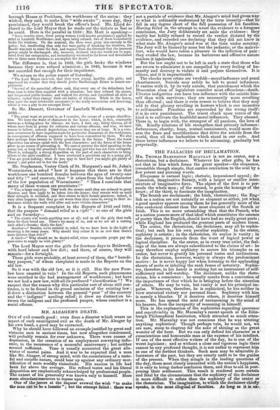MR. ALSAGER'S DEATH.
OUT of evil cometh. good : even from a disaster which wears an aspect of such unmitigated evil as the death of Mr. Meager by his own hand, a good may be extracted.
Why he should have followed an example justified by great and virtuous men in ancient times, but now altogether condemned, will probably remain for ever unknown. There were causes of depression, in the cessation of an employment conveying influ- ence, in the recurrence of a mournful anniversary ; but neither seemed sufficient. Time is usually accounted the great alle- viator of mortal pains. And it was to be expected that a man
like Mr. Al r, of strong mind, with the consolations of a taste- ful and amiable nature, could bear up against any ordinary mor- tification of mere worldly vicissitude. His success in life had been far above the average. His refined tastes and his liberal disposition are emphatically acknowledged by professional people. The extent of his generosity was known only to himself. Here seem abundant resources to repose upon.
i
One of the jurors at the inquest avowed the wish "to make the wan out to be a lunatic " ; but the attempt failed : there was not a particle of evidence that Mr. Alsager's mind had given way to what is ordinarily understood by the term insanity—that he fell in any degree short of the full possession of his faculties.- Having. failed in the attempt to wrest the evidence to a foregone conclusion, the Jury deliberately set aside the evidence : they tacitly but boldly refused to record the verdict dictated by the evidence, and recorded one declaring that they did not know in what state Mr. Alsager's mind was at the time under scrutiny. The Jury will be blamed by none but the pedantic; or the malevo- lent, who would have taken a pleasure in the infliction of pain : they evaded the law, because its barbarous and offensive nature renders it iiipolerable.
But the law ought not to be left in such a state that those who are sworn to administer it are compelled by every feeling of hu- manity and decency to violate it and perjure themselves. It is odious, and it is impracticable. The checks upon crime are twofold—moralinfluence and penal chastisement. Suicide may safely be left to moral influences. It carries with it, by its very nature, that punishment which the Draconian class of legislators consider most efficacious—death. Ulterior indignities can have less influence with the suicide him- self than with survivors : they are necessarily more revolting than effectual ; and there is even reason to believe that they may add to that gloomy revelling in horrors which is one incentive to self-murder. Penalties are superseded by the wrong itself: it is its own punishment. The truest check upon errors of the kind is to cultivate the healthful moral influences. They abound. There is, to begin with, the strongest of all passions, the love of life. Kindly relations of life strengthen that primary influence : forbearance, charity, hope, mutual sustainment, would more dis- arm the fears and mortifications that drive the suicide from the world, than all the barbarities which stand in our code. And those better influences we believe to be advancing, gradually but perpetually.


























 Previous page
Previous page